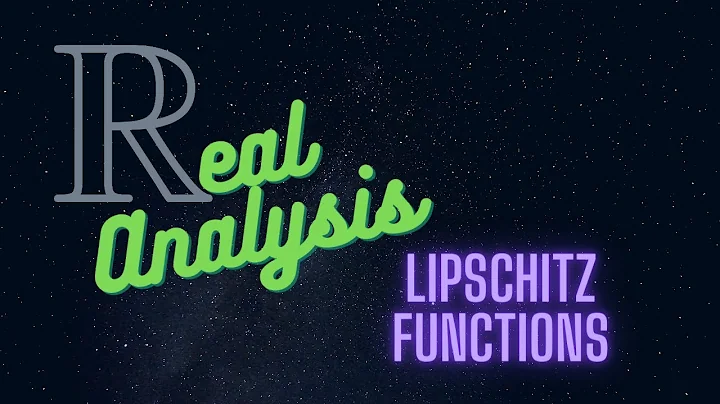Showing Y SqrtX is Lipschitz Continuous
How to show square root of absolute of x, $\sqrt{|x|}$, is not Lipschitz continuous?
Solution 1
The derivative of $\sqrt{|x|}$ is $\frac{\mathbb{sgn}(x)}{2\sqrt{|x|}}$. Let $x_0 = \frac{1}{4L^2}$. The derivative at $x_0$ is $L$, so, the derivative is unbounded.
Solution 2
Consider only the interval $[0,a]$ for some $a>0$ and suppose that $f(x)=\sqrt{|x|}$ is Lipschits: $|f(y)-f(x)|\leq L|y-x|$. Then for $x=0$ and $y<a$ we should have:
$|\sqrt{y}|\leq L|y|\Leftrightarrow \sqrt y\leq Ly\Rightarrow \frac{\sqrt y}{y}\leq L$ for each $y>0$. But this is impossible since for $y\rightarrow 0^+$, the LHS tends to $+\infty$.
Solution 3
The function you seem to consider in 1. is not even defined everywhere. What should it be for $x=y$? Thus this argument does not work.
The "problem" occurs around $0$. Assume the function is Lipschitz with constant $C$. Then $|f(x)-f(0)| \le C |x-0|$ for all $x$. So $f(x)/|x| = \sqrt{|x|}/|x| \le C$ for all $x$ which is not true.
Related videos on Youtube
Comments
-
$f(x) = \sqrt{|x|}$ is a famous example of a function which is not Lipschitz continuous but is uniformly continuous. This link shows detailed explanation of it.
Here provides the figure of this function:

However, I am still confused about how to show $\sqrt{|x|}$ is not Lipschitz continuous?
- Consider $[-a,a]$, which is compact. $\frac{f(y)-f(x)}{y-x}$ should be bounded by $L$. This method is also used to prove $f(x)$ is a uniformly continuous.
- On $[a,\infty)$ and $(-\infty,-a]$, $f(x)$ has a bounded derivative.
So, based on 1 and 2, $f(x) = \sqrt{|x|}$ is Lipschitz continuous.
I have no idea how to prove it is not a Lipschitz continuous; clearly speaking I do not know how to distinguish the proof of Lipschitz continuity from uniformly continuity.
-
Suppose that the derivative IS bounded (by L). Then you can find $x_0$ such that $f'(x_0) \geq L$
-
Then I should ask the difference in the proof of uniformly continuous and Lipshitz continuous in this example. They look quite similar.
-
Note that $f$ does not have a bounded derivative on $[-a,a]$
-
Maybe I get it. we prove Uniformly continuity by using limit but prove Lipshitz continuity by derivative.
-
Lipshitz condition $|f(x)-f(y)|\le L|x-y|$ means that $f(x)-f(y)$ becomes small as fast as $x-y$, i.e. at least linear decay. For uniform continuity it is enough that $f(x)-f(y)$ just becomes small as $x-y$ becomes small, but no demand on how fast. For example, the condition $|f(x)-f(y)|\le\sqrt{|x-y|}$ will give uniform continuity, but does not give Lipshitz, since $\sqrt{|x-y|}$ goes to zero too slow.
-
To the first part, if your claim is true, then we cannot find a function which is differentiable because we could always make $x = y$
-
It seems that in 1. you try to use the result that a continouus function on a compact set is bounded. If you want to use this result you need a continous function on a compact set. What is you function and what is your set? (Or what are you trying to say in 1?)
-
$[-a,a]$ is a set in $\mathbb{R}$, for example $[-5,5]$. I make an error in 1. i.e. the derivative is not bounded.
-
The derivative at $x_{0}$ is $L$ then why the derivative is unbounded, I only see it becomes unbounded at $x=0$?
-
@BAYMAX Here, we talk about the derivative being unbounded on a whole set $[a, +\infty)$ (where $a>0$), not at one exact point. Since for any $L > 0$, there exists a point $x_0 \in [a, +\infty)$ where the derivative is $L$, we conclude that the derivative is unbounded globally.
-
@BAYMAX Oh, I apologize. I meant $(0, +\infty)$ instead of $[a, +\infty)$.
Recents
Related
Source: https://9to5science.com/how-to-show-square-root-of-absolute-of-x-sqrt-x-is-not-lipschitz-continuous





0 Response to "Showing Y SqrtX is Lipschitz Continuous"
Post a Comment